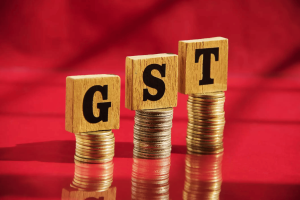The goods and services tax (GST) bill, which went into effect on July 1, 2017, was hailed as India’s most significant tax reform since independence. While the GST regime does not directly apply to the real estate sector, Section 2(119) of the Central Goods and Services Tax (CGST) Act, 2017 defines and covers the construction of complexes, buildings, civil constructions, and so on as works contract services.
GST charges on real estate
| Type of property | GST charged |
| Affordable housing | 1% |
| Residential | 5% without ITC |
| Commercial | 12% |
It should be noted that GST is only paid on properties that are currently under development. Ready-to-move-in properties are not subject to GST. Legally, a completed project is one that has received a completion certificate (CC) from a competent body.
What is the rate of GST on real estate?
The GST rate on real estate is 1% for properties that are considered affordable. It is 5% without the input tax credit (ITC) for residential properties. The GST on commercial real estate is 12%.
GST 2025 on real estate
| Ready to move properties | Not applicable |
| Resale | Not applicable |
| Land purchase and sale | Not applicable |
| Under construction properties (housing bought under CLSS) | 8% |
| Under-construction properties | 12% |
| Works contract | 18% |
| Composite supply of works | 18% |
| Composite supply of works to Govt Authority | 12% |
| Composite supply of use for the general public | 12% |
| Composite supply of works contract for affordable housing | 12% |
What is the effect of GST on real estate?
Since the implementation of the GST in 2017, investment in under-construction properties has become more hassle-free for the average person, particularly with the end of the previous tax regime, which imposed a slew of taxes on such investments. A unified tax framework – the GST rate on real estate helps buyers understand the types of taxes they will have to pay at the time of property acquisition.
The government has also given a significant boost to investment in affordable residential estate by rationalising the GST rate.
The GST policy has also proven quite beneficial in terms of developer assistance. “Under the previous regime, developers were required to pay a slew of taxes, including VAT, Central Excise, Entry Tax, LBT, Octroi, Service Tax, and others, the credits for which were not readily available against the production tax burden. However, the GST regime allows for ITC eligibility on construction and other services purchased, minimizing the inefficiency brought about by the cascading effect of taxes,” according to a PwC India analysis.
Impact of GST on Stamp Duty and Registration Charges
Despite repeated requests since the implementation of the GST regime to eliminate stamp duty and registration taxes on property, the government has made little progress in this regard. As a result, stamp duty and registration fees are applicable in India for property transfers. While states levy stamp duty in the range of 5%-10%, the registration fee is either 1% of the property value or a set price.
Is GST levied on stamp duty?
Stamp duty and registration charges are exempt from GST. Stamp duty is a levy imposed by the state government that varies from state to state. This cannot be classified as a product or service. As a result, stamp duty and registration are exempt from GST.
House purchase taxes prior to the adoption of the GST on real estate
Before a single tax, the GST, was established in 2017, a range of state and central taxes were levied on buildings at various stages of the development cycle. While these levies raised the cost of development for builders, they could not claim a credit against the production liability. Prior to the implementation of the GST, real estate developers had to pay the following taxes:
- Value Added Tax (VAT)
- Central Excise
- Entry Tax
- LBT
- Octroi
- Service tax, etc.
The buyer was subsequently charged for the costs paid by builders in paying these taxes. Furthermore, the complexity of the rate applicability of the various taxes allowed developers to alter data in order to charge purchasers more. It used to be difficult for the average buyer to determine the VAT, Central Excise, Entry Tax, LBT, Octroi, and service tax rates applicable to property building.
GST on real estate: Changes made
The GST consolidated several indirect taxes to provide taxpayers with a more uniform system. Since its inception, several changes have been made to the bracket in which GST on real estate is levied.
Central and state taxes that GST subsumed
Central taxes
Excise Duty
Customs Duty
Special Additional Duty of Customs
Service Tax
Central Sales Tax
Central surcharge and cess on supply of goods and services
State taxes
State Value Added Tax
Entertainment Tax
Luxury Tax
State Excise Duty
State surcharge and cess on supply of goods and services
Taxes on advertisement
Purchase tax
Taxes on lotteries, gambling and betting
GST rate on real estate 2025
Homebuyers in India pay a GST rate on real estate when they purchase under-construction properties such as flats, apartments, bungalows, and developable land. The GST rate on real estate is 1% for properties that are considered affordable. Other properties are subject to 5% GST on real estate.
GST on flat purchase in 2025
| Property type | GST on real estate till March 2019 | GST on real estate rate from April 2019 |
| Affordable housing* | 8% with input tax credit (ITC) | 1% without ITC |
| Non-affordable housing | 12% with ITC | 5% without ITC |
GST on real estate: On government housing schemes
The government has stated that the GST rate for affordable housing will be 1% under the new regime. These housing initiatives include the Jawaharlal Nehru National Urban Renewal Mission, the Rajiv Awas Yojana, the Pradhan Mantri Awas Yojana, and state-level housing schemes.
GST calculation on affordable property
Here’s how to compute GST on flat purchases in the affordable housing segment before and after the rate adjustment on April 1, 2019.
| Affordable housing | GST on affordable housing before April 1, 2019 | GST on affordable housing after April 1, 2019 |
| Property cost per sq ft | Rs 3,500 | Rs 3,500 |
| GST rate on flat purchase | 8% | 1% |
| GST | Rs 280 | Rs 35 |
| ITC benefit for material cost of Rs 1,500 at 18% | Rs 270 | Not applicable |
| Total | Rs 3,510 | Rs 3,553 |
What is the impact of GST on luxury property?
Buyers of luxury houses will save more money with the increased GST rates than they would have previously. Here’s how to compute GST on a flat purchase in the premium segment:
| Luxury housing | Before April 1, 2019 | After April 1, 2019 |
| Property cost per sq ft | Rs 7,000 | Rs 7,000 |
| GST rate on flat purchase | 12% | 5% |
| GST | Rs 840 | Rs 350 |
| ITC benefit for material cost of Rs 13,000 at an average of 15% | Rs 126 | Not applicable |
| Total | Rs 7,714 | Rs 7,350 |
What is the GST rate for the construction of commercial units (shops, godowns, offices, etc.) in a real estate project?
| Description | Effective rate of GST (after deducting land value) |
| Construction of commercial units in a Residential Real Estate Project (RREP), as specified in question no. 6 below, which begins on or after April 1, 2019, or in a continuing project in respect of which the promoter has elected for revised rates beginning April 1, 2019. | 5% without ITC on total consideration. |
| Construction of commercial units in a Real Estate Project (REP) other than Residential Real Estate Project (RREP) or in an ongoing project for which the promoter has chosen outdated rates | 12% without ITC on total consideration. |
GST on other expenses for commercial and residential properties.
Other costs classified as real estate-related services for both commercial and residential property are subject to an 18% GST. This includes fees for:
- Brokerage
- Legal consultation
- Parking
- Electric meter installation
- Gas pipe line meter installation
- Water connection charges
- Society maintenance
- Water connection
- External development charges
- Internal development charges
- Home inspection fees
- Home insurance fees
- Home loan processing fees
- Closing costs
GST on construction services
According to a Supreme Court ruling issued on October 3, 2024, real estate companies can claim Input Tax Credit (ITC) on construction costs for commercial buildings that are rented or leased out.
While real estate in India is not directly subject to the GST regime, several activities and services in the sector are taxed under the new system. The following are the rates at which related activities in the construction sector are taxed under the GST regime in India:
| Under-construction home bought under the PMAY Credit-Linked Subsidy Scheme (CLSS) | 8% |
| Under-construction home bought without the subsidy | 12% |
| Works contract for affordable housing | 12% |
GST rate on building materials
The Goods and Services Tax (GST) covers real estate in India through works contracts and building and constitution works, as all components used in the development work attract GST. To put it simply, covered under the new regime is the Indian construction industry, which continues to attract high rates of taxes through a blend of levies imposed on the purchase of various building construction materials.
What is input tax credit (ITC) under GST?
The GST law’s ITC scheme distinguishes it from India’s prior tax system. A real estate developer pays tax on the purchase of goods and services several times over the life of a housing project. Under the GST regime, the builder would receive an input tax credit when he paid his output tax.
A developer must pay Rs 25,000 as tax on his final output. The builder has previously paid Rs 21,000 in input tax while acquiring goods such as steel, cement, and paint. In this case, he would only have to pay Rs 4,000 in output tax after deducting the input tax credit.
GST on maintenance charges
Flat owners are liable to pay 18% GST on residential property, if they pay at least Rs 7,500 as maintenance charge to their housing society. Housing societies or residents’ welfare associations (RWAs) that collect Rs 7,500 per month per flat, also have to pay 18% tax on the entire amount. Housing societies which have an annual turnover of less than Rs 20 lakhs are, however, exempted from paying the GST. For the GST to be applicable, both the conditions should apply – i.e., each member should pay more than Rs 7,500 per month as maintenance charge and the annual turnover of the RWA should be higher than Rs 20 lakh.
The government has also clarified that the entire amount is taxable, in case the charges exceed Rs 7,500 per month per member. For example, if the maintenance charges are Rs 9,000 per month per member, the 18% GST on flats will be payable on the entire amount of Rs 9,000 and not on Rs 1,500 (Rs 9,000-Rs 7,500). Also, owners with multiple flats in the same housing society will be taxed for each unit separately.
RWAs, on the other hand, can claim ITC on the tax they pay on capital goods (generators, water pumps, lawn furniture, etc.), goods (taps, pipes, other sanitary/hardware fittings, etc.), and input services such as repair and maintenance.
GST on rent
Mentioned below are queries on GST.
When is the tenant liable to pay GST?
GST-registered tenants who lease a residential unit will be required to pay 18% tax on the rent amount. The GST Council announced a modification in this regard on July 13, 2022. The new rule applies to individual service providers earning more than Rs 20 lakh per year and businesses earning more than Rs 40 lakh per year; in both cases, GST registration is mandatory for the individual/business.
When is the landlord liable to pay GST?
The GST regime considers renting residential property for commercial purposes to be a form of service supply. If the annual rent exceeds Rs 20 lakh, the landlord is required to pay an 18% GST rent on real estate – residential units. In this instance, landlords must register to pay GST on their rental revenue. Commercial property rentals are subject to an 18% GST.
GST on home loan
While the GST does not apply to home loan repayment for the borrower, financial institutions provide a variety of’services’ as part of the home loan process. Given that these are services, GST is applicable. As a result, if you apply for a house loan, the bank will impose GST on the processing, technical valuation, and legal fees.
GST on the one-time maintenance deposit paid by builders and developers.
The GST applies to the one-time maintenance deposit collected by builders from property buyers, according to the Gujarat bench of the Authority for Advance Rulings (AAR). According to the authority, this charge is classified as a provision of services and is non-returnable. However, the AAR stated that GST will be deducted from the maintenance payment when it is spent on future maintenance work.
Recall here that most real estate developers collect a one-time maintenance deposit from home buyers, before the formation of the residents’ welfare associations or cooperative housing societies that take over the responsibility of maintenance from the builder. After the formation of the RWA and CHS, they become solely responsible for the maintenance work and can come up with their own set of rules for calculating maintenance charges. The builder would no longer be able to have a say in the matter.
This particular obligation of home buyers is computed based on the size of the property; a certain per square foot rate must be paid by the home buyers. The total amount collected from customers as a one-time maintenance charge is then transferred into a shared fund and used for the intended objectives as needed.
It has been customary practice among developers to subtract GST at the 18% rate immediately after collection and then deposit the remainder into the common fund. Following the AAR verdict, developers would have to submit the entire sum without any GST deduction.
It should also be noted that prior to the GST regime’s implementation in 2017, builders were not required to pay service tax on such maintenance deposits.
With the AAR’s verdict, RWAs and CHSs can now collect GST from society members when the time comes to use it, as the builder would have charged this duty initially.
GST on developable land
Only developable plots are those where the owner has obtained all necessary permissions from local and municipal authorities to carry out future development over the land parcel. The owner must also develop the basic infrastructure to facilitate future development. If any or all of these activities have been performed on the land parcel, it would qualify as developable land.
- Demarcation of plot
- Ground leveling
- Boundary wall construction
- Road construction
- Construction of overhead tanks
- Laying work of water pipelines
- Laying work of underground sewerage lines
- Setting up of water harvesting facility
- Setting up of sewage treatments plants
- Development of landscaped gardens
- Setting up of a drainage system
If you invest in developable plots, you will not have to pay GST. This is supported by a circular issued by the Central Board of Indirect Taxes and Customs (CBIC) on August 3, 2022, which states that plot sales do not attract GST even if some basic infrastructure has been developed. The Karnataka AAR recently passed a similar order.
Previously, some state officials had a contrary opinion. In July 2022, for example, the Madhya Pradesh Appellate Authority of Advance Ruling (AAAR) stated that land sold following development activities will be subject to 18% Goods and Services Tax. A similar decision was issued by the Gujarat Authority of Advance Ruling in 2021.
Prior to the GST regime, the sale of immovable properties was exempt from the value-added tax, therefore only direct taxes such as stamp duty and registration charges were paid in such transactions.
GST on plot
While the selling of plots is likewise exempt from GST, any little construction on the plot is subject to GST. When such a plot is sold, one-third of its value is excluded, and GST is imposed on the remaining two-thirds of the land’s worth.
GST impact on stamp duty and registration charges
Despite repeated requests since the implementation of the GST regime to eliminate stamp duty and registration taxes on property, the government has made little progress in this regard. As a result, stamp duty and registration fees are applicable in India for property transfers. While states levy stamp duty in the range of 5%-10%, the registration fee is either 1% of the property value or a set price.
GST refund on flat purchase cancellation
Changes to the GST rules are likely to be adopted to allow homebuyers to receive a GST refund if they cancel a property purchase on which they have already paid the tax. Unregistered entities, such as homeowners, cannot currently claim GST refunds under the new tax structure. The 48th GST Council meeting, held on December 17, 2022, suggested a revision to the CGST Rules, 2017, as well as the issuing of a circular, to regulate the procedure for filing an application for refund by unregistered customers in such instances.
Myths about GST on real estate
GST is only applied to under-construction flats, not ready-to-move-in flats.
It is vital to highlight that the GST excludes the real estate sector. The tax rate for a property building is levied under ‘work contracts’. This is precisely why a developer cannot impose GST on the sale of ready-to-move-in homes. A property is considered ready-to-move-in once it has been completed and received the occupancy certificate, and it is no longer covered by the work contract. In brief, the GST would apply to the sale of under-construction properties that have not yet received their OCs. It is also worth noting that under the former regime, buyers were required to pay service tax on the purchase of ready-to-move properties.
However, since the developer/owner has paid GST as part of the purchase, he would eventually package this expense as part of the overall cost of the property. This basically means that while there is no GST applicability on ready homes, the buyer ultimately pays it anyhow.
GST is not applicable on land transactions
The GST on building services does not apply to the sale of land because no goods or services are transferred. Because the cost of land is an important element in determining property values, GST offers a standard abatement of 33% of the total contract value for taxable real estate transactions.
How to calculate GST on real estate for under-construction flats?
Suppose a builder sells an under-construction property valued Rs 100 to a customer. on compute the GST on building, Rs 33 will be deducted from the land value, and the GST on construction will be applied solely on the remaining Rs 77.
What is affordable housing under GST?
According to the government-determined definition, housing units worth up to Rs 45 lakh qualify as affordable housing. However, the unit must also conform to certain measurements limits to qualify as affordable housing. A housing unit in a metropolitan city qualifies to be an affordable house if it costs up to Rs 45 lakh and measures up to 60 sqmt (carpet area). The Delhi-National Capital Region, Bengaluru, Chennai, Hyderabad, the Mumbai-Mumbai Metropolitan Region and Kolkata are categorised as metropolitan cities. A housing unit in any other city barring the ones mentioned above in India qualify to be an affordable house if it costs up to Rs 45 lakh and has up to 90 sqmt of carpet area.
How do I calculate the Rs 45 lakh ceiling to determine affordable housing eligibility?
To compute the Rs 45 lakh limit, consider charges such as preferred location, parking, development, and common utilities. You do not need to consider stamp duty, maintenance charges, maintenance deposits, common infrastructure upkeep, or other factors when determining eligibility.
GST calculation on affordable property
Here’s how to compute GST on flat purchases in the affordable housing segment before and after the rate adjustment on April 1, 2019.
| Affordable housing | GST on affordable housing before April 1, 2019 | GST on affordable housing after April 1, 2019 |
| Property cost per sqft | Rs 3,500 | Rs 3,500 |
| GST rate on flat purchase | 8% | 1% |
| GST | Rs 280 | Rs 35 |
| ITC benefit for material cost of Rs 1,500 at 18% | Rs 270 | Not applicable |
| Total | Rs 3,510 | Rs 3,553 |
How did GST impact luxury property?
Buyers of luxury houses will save more money with the increased GST rates than they would have previously. Here’s how to compute GST on a flat purchase in the premium segment:
| Luxury housing | Before April 1, 2019 | After April 1, 2019 |
| Property cost per sq ft | Rs 7,000 | Rs 7,000 |
| GST rate on flat purchase | 12% | 5% |
| GST | Rs 840 | Rs 350 |
| ITC benefit for material cost of Rs 13,000 at an average of 15% | Rs 126 | Not applicable |
| Total | Rs 7,714 | Rs 7,350 |
How did GST impact real estate sector?
Since the implementation of the GST in 2017, investment in under-construction properties has become more hassle-free for the average person, particularly with the end of the previous tax regime, which imposed a slew of taxes on such investments. A unified tax framework provides buyers with information on the types of taxes they will have to pay at the time of house acquisition.
The government has also given a significant boost to investment in affordable property by rationalising GST rates.
The GST policy has also proven quite beneficial in terms of developer assistance. “Under the previous regime, developers were required to pay a slew of taxes, including VAT, Central Excise, Entry Tax, LBT, Octroi, Service Tax, and others, the credits for which were not readily available against the production tax burden. However, the GST regime allows for ITC eligibility on construction and other services purchased, minimizing the inefficiency brought about by the cascading effect of taxes,” according to a research by consulting firm PwC India.
GST applies if electricity charges added to rent, maintenance fee
When electricity charges are combined with rent or maintenance fees levied by real estate developers, mall operators, or airport operators, the service is classified as a composite supply under the Goods and Services Tax (GST) system. As a result, the Central Board of Indirect Taxes and Customs (CBIC) clarified that such a service will be subject to 18% GST. Even if power is billed separately, the supplies will form a composite supply, it stated. The CBIC’s latest clarification means that tenants of commercial premises will be required to pay 18% GST on power rates if the service is bundled with property rental or maintenance. According to tax experts, this would result in greater rental costs for tenants, as landlords would factor in a higher rate while offering the supply.
Homebuyer queries on GST on real estate
Who pays the GST: the homebuyer or the builder?
What are the GST rates for the construction of residential apartments?
| Description | Effective rate of GST (after deducting land value) |
| Construction of affordable residential apartments | 1% without ITC on total consideration. |
| Construction of residential apartments other than affordable residential apartments | 5% without ITC on total consideration. |
Does a promoter or builder have the choice of paying tax at the former rates of 8% and 12% with ITC?
Yes, but this option is only available if the project is still running. In the case of such a project, the promoter or builder has the option of paying GST at the former effective rate of 8% or 12% with ITC. To maintain the former rates, the promoter/builder must exercise a one-time option on the required form and submit it manually to the jurisdictional Commissioner by May 10, 2019. However, in the event that a promoter or builder does not exercise the option in the required manner, It will be assumed that he has chosen new rates for ongoing projects, and the new GST rate of 5% / 1% will apply, as well as all of the new scheme’s rules, including transitional measures. There is no such option available for projects starting on or after April 1, 2019. Construction of residential units in projects beginning on or after April 1, 2019 will be subject to the new GST rate of 1% or 5% without ITC.
Can a constructor collect GST from their customers?
Yes, builders can collect GST from customers.
What is the GST rate on the transfer of development rights, FSI, and long-term lease of land?
Exemption applies to the supply of TDR or FSI, as well as long-term leases of land utilized for the building of residential flats in a project that are booked prior to the issuance of a completion certificate or first occupation.
The supply of TDR or FSI or long-term lease of land on such value that is proportionate to the construction of residential apartments that remain un-booked on the date of issue of completion certificate or first occupation, would attract GST at the rate of 18%, but the amount of tax will be limited to 1% or 5% of the value of the apartment depending on whether the residential apartments for which such TDR or FSI is used, in the affordable residential apartment category or in other
TDR, FSI, or long-term leases of land utilized for the development of commercial flats will be subject to an 18% GST. The above apply to the supply of TDR or FSI, as well as the long-term lease of land utilized in new developments with a new rate of 1% or 5%.
Who is required to pay GST on TDR and Floor Space Index?
The builder is required to pay GST on TDR or floor space index supplied on or after April 1, 2019, on a reverse charge basis.
I am a PMAY CLSS beneficiary, and the carpet area of my house under construction in an ongoing project is 150 sqm. Am I entitled for the new 1% rate on the same?
You are eligible for the new GST rate of 1%, provided that the developer-promoter with whom you booked the property has not exercised the option to pay tax on apartment building at the previous rate of 8%.
I have already paid 12% tax (effective) on instalments paid before April 1, 2019. I’d like to benefit from the new 1% or 5% interest rate. Is it the builder or the buyer who has the option of paying tax at the new or old rate?
The buyer cannot choose to pay tax at the new or old rates. The builder must exercise the option of paying tax on apartment development at the old rate of 12% by May 10th, 2019. If the builder does not exercise his option to continue paying tax at the old rate by the specified date, the effective GST rate applicable to all instalments payable to the builder on or after 01.04.2019 as per the contract will be either 1% or 5%, depending on whether the apartment is affordable or not.
Conclusion
Prior to the implementation of the GST, more than a dozen levies were levied on real estate in India, the country’s second-largest employment generator behind agriculture. As a result, the sector faces high tax rates and regulations. The implementation of the GST has eliminated other direct and indirect sector levies on property transactions, boosting the sector significantly, notwithstanding its short-term impact.
















